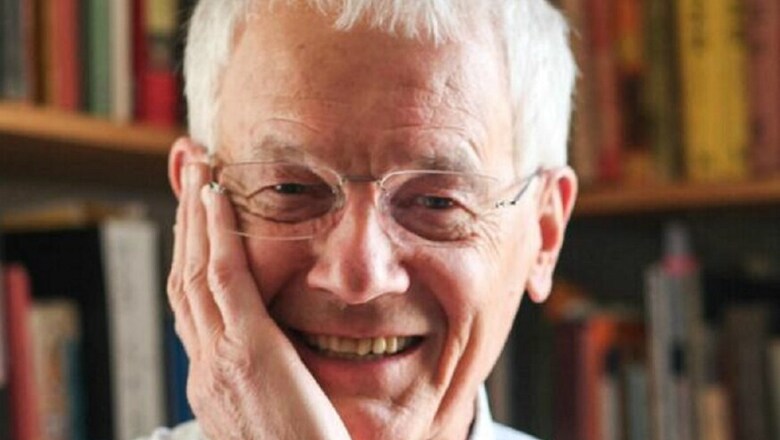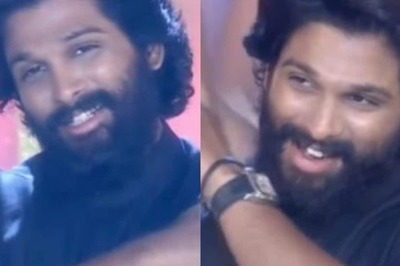
views
From writing about Bhakti movement in A Storm of Songs: India and the Idea of the Bhakti Movement to chronicling Surdas' poetry in Sur’s Ocean: Poems from the Early Tradition, John Stratton Hawley has written and edited 20 books, most of which are on Hinduism. The religious scholar, who completed his PhD from Harvard in 1977, on 'The Butter Theif' (Lord Krishna) has dedicated the last four decades of his career, researching about the religious life in north India, and studying Indian religious literature.
Hawley, who is currently a professor of religion at Barnard College, Columbia University, was in India recently to promote his new book Krishna's Playground: Vrindavan in the 21st Century which explores the changing face of India's spiritual city Vrindavan. The book throws light on how climate change and burgeoning real estate is changing, not just the architecture and landscape of Vrindavan, but also the very fabric of the place as 'temples are now styled as theme parks, and the world’s tallest religious building is under construction in Krishna’s pastoral paradise.'
In an interview with News18.com, the professor discussed his latest book Krishna's Playground: Vrindavan in the 21st Century the modern face of Bhakti movement and commodification of religion. Here are a few excerpts from the interview:
How has the real estate boom in the past couple of decades impacted the architectural and spiritual heritage of Vrindavan?
It has created a 'New Vrindavan' that occupies as much space as the old, a space that looks more like Gurgaon than like the Vrindavan that existed at the turn of the 21st century. That’s the architectural part. About the spiritual part, it is striking how many of the temples that have been built in the new part of town seem also to depart from a heritage that aligns the town with Krishna, Radha, the Gopis, and Krishna’s knockabout sidekicks. We now have Vaishno Devi and Jvala Mukhi too, and a big temple to Shiva is on the way. Not that goddesses are absent from the old Vrindavan—or Shiva—but this monumental public presence is new.
While climate change has already started to wreak havoc in Vrindavan, man-made damages such as the polluted Yamuna, the disappearance of ghats, the vanishing forests have also impacted this place. What kind of bearing do you think these changes might have on Vrindavan's status as one of India's most popular religious tourism destination?
It’s a sad thing that visitors to Vrindavan can no longer expect to bathe in the river that provided the conditions that made Vrindavan come into being. The Yamuna is the mother of Vrindavan, cradling it on three sides, but who would drink those waters today?
Pollution is rampant and water is scarce. Even the water below the surface of the earth is dramatically shrinking away from the town. The new girders sunk into the side of the Yamuna in the name of Riverfront Beautification have played a dramatic part in that. Vrindavan always stood for a symbiosis between nature’s forms of play and our human ones. In legend and story, Krishna acted as the mediator between the two. Many modern pilgrims, indeed, visitors of all kinds, may soon find themselves estranged from all of that. Or they’ll have to get the message virtually, in theme parks and gated communities. And so our species will be increasingly self-absorbed without even noticing it.
Vrindavan always served as a countervailing force to the urban instinct in us all---the narcissistically human. Is that breath of fresh air now gone? People still seek it out, though. Hordes come to Vrindavan every weekend, hoping to taste its centuries-old fun. It’s magic. They keep that magic alive. But can that magic last if the very reason for the town’s existence is effaced?
Vrindavan is popularly known as Lord Krishna's childhood hometown, and therefore, considered a holy city. Its rich religious history has obviously been commodified to draw tourists from all over the world over the years. But, in your experience, how much of this history is actually being preserved as new theme park-esque temples are being built, and ancient ghats are being replaced instead of being restored?
I suspect our “commodifying” tendencies have always existed, just not in the forms we know them today. We shouldn’t despair of being separated from the past on that account. But in the case of Vrindavan, the theme-park mentality does threaten the very thing it thematizes. If everything depends on a louder, more immediate bang, then the far quieter lure of Krishna’s flute is easy to drown out. I shrink to think that my own country is responsible for a lot of this international noise. But India has certainly been unafraid to play it loud.
Krishna’s lilas are both bold and subtle. They don’t just map onto whatever comes out of Universal Studios and Facebook.
How do you think the Bhakti tradition evolved in modern times?
In my book A Storm of Songs, I’ve tried to show that the idea of the Bhakti movement is far more recent in origin than we think. This symphony of songs undoubtedly goes back for almost two millennia, but the way we tend to understand it, as the bhakti movement, goes only as far back as the period in which Vrindavan itself was established. It was a northern idea, a northern idea about the south. But it took a while to crystalize as “the bhakti movement”. That crystallization happened when India itself did—in the 1920s, 30s, and 40s.
In its formative stages Independent India claimed that beautiful myth, seeing in it an expression of the very expressivity of the nation as a whole. Well and good! And why? Because it’s always involved Muslims as well as Hindus—Sufis and Sants and Jains as well as Shaivas and Vaishnavas. Let’s not forget what a beautifully complex fabric that is. Let’s not let bhakti become a partisan word.



















Comments
0 comment